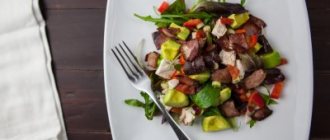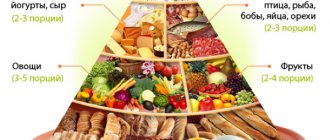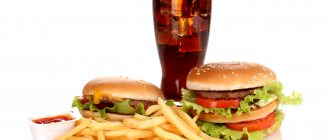What is intuitive eating?
The method of intuitive eating is fundamentally different from various diets. Depending on the severity of the chosen dietary menu, a person has to limit himself in food consumption to a greater or lesser extent. The consequences of such restrictions are often dire.
Some time later, most people after completing a diet (often during it) experience breakdowns, which often lead to overeating.
In this regard, the intuitive nutrition method uses a fundamentally different approach to choosing food products - the body should be given exactly what it needs at the moment and it will be satisfied.
At the same time, what you eat will not be stored in the form of extra pounds. The main condition for successfully following this technique is the ability to understand your desires and listen to your body. In other words, intuitive eating is not exactly a diet, but rather a way of life, where the main principle is a rational and reasonable approach to food.
Down with diets, taboos and scales
The first diet always works well. This may last a year, two or even three: you are still young, you have an active metabolism. If it is the fourth, fifth, seventh (in the clinic we see people who have had 20-25 visits), then this stops working very quickly: overeating appears, weight is gained and the whole story becomes very dramatic.
I find it difficult to understand why people continue to do this despite the fact that all previous attempts have been unsuccessful. How brainwashed are we that people keep saying, “Maybe this time I’ll finally succeed? This is a completely new diet. It’s not even a diet.”
Cunning diet sellers know that today the word “diet” has become almost a dirty word. That's why they say: this is not a diet, this is a way of life, this is a nutritional pattern, this is such a special structure. But a diet is just that: a diet. If there are at least some dietary restrictions, then this is a diet.
When you give up diets, you need to give up the idea of forbidden foods . I'm not talking about medical restrictions. If any of us have an allergy, sensitivity to gluten, sensitivity to cow's milk protein - in this case, of course, we need to follow medical instructions. But if a product is prohibited because “I start eating it and won’t be able to stop” (this is the most common reason for prohibitions), then such products should not be in intuitive nutrition.
Photo by Jay Wennington on Unsplash
And lastly, you need to stop weighing yourself , measuring yourself, weighing food, measuring its calorie content, keeping food diaries. There is no more effective way to increase your anxiety level than to weigh yourself in the morning. Our whole life passes under the influence of horror when looking at the scales. This is very beneficial for the diet industry. If we start working with a weight chart and make sure that these weight fluctuations are not leading anywhere, that the weight remains the same (if we are not on a diet), then little by little we can calm down.
Not weighing yourself is a very bold step . It seems to a person that if he stops controlling it, he will swell and stop walking through the door. But in fact, our metabolism is a tool that has been developed by evolution to ensure that our weight is constant and stable. Plus age.
There are some age-related changes. With each pregnancy, a woman gains 2-3 kilograms (if she is initially large, then maybe 4-5 kg). But nothing more. No +15 after childbirth is the norm - something is wrong here. We are, of course, talking about practically healthy people. Because there are many reasons, hormonal disorders, metabolic disorders, and other diseases that lead to weight gain.
Power System Principles
Intuitive nutrition, which has controversial reviews from people who have lost weight, is based on 2 basic principles:
- You should only eat when your body is experiencing real physical hunger, not emotional hunger. When physically hungry, a person really needs to replenish nutrients in the body. At the same time, its manifestations are purely physiological - the stomach may grumble, weakness, irritability, and a feeling of nausea may appear due to the fact that the stomach is empty. It is this kind of hunger that can be satisfied without a twinge of conscience, with foods that the body prompts at a particular moment. With emotional hunger, the desire to eat something arises very often (sometimes constantly) in order to distract from boredom, sadness, and monotony. At the same time, there certainly appears a desire to eat something specific that can bring joy (chocolate, candy, pizza), whereas during physical hunger the body will gratefully accept any food (broccoli, a piece of bread, lean meat);
- listen to the body’s signals when choosing a particular product, and also learn to understand the moment when the body is full. The body itself knows best whether it is hungry or not. If you learn to listen to these signals, the problem of overeating will go away by itself - the body will consume as much food as is necessary for a normal life.
Intuitive eating and physical health
Even more interesting research concerns physical health. The first idea of an unprepared person: “Oh, intuitive eating is, in short, eating everything? Donuts, chocolates, we wash it all down with liters of cola, and then we get diabetes? The Americans probably came up with this to eradicate the Russian people.”
In fact, intuitive eating as a model is inversely associated with disinhibited eating, eating anxiety, fat mass, body mass index, and cardiovascular disease risk. But it is positively associated with high-density cholesterol levels (the so-called “good” cholesterol, which helps us burn fat).
How does PI help you lose weight and maintain a healthy weight?
Intuitive nutrition, reviews of people who have lost weight about which inspires them to start a new lifestyle, with the right approach really helps you lose weight. The basis of intuitive eating (in addition to the call to listen to your body) is gradually getting used to eating healthy food.
In essence, intuitive nutrition is proper nutrition without counting calories and restrictions, where possible indulgences are not perceived as failures.
If you do everything correctly and allow the body to eat exactly as much as it needs to replenish energy, then overeating will be eliminated. Many people who began to adhere to this technique were surprised to note that they began to eat smaller portions and the weight actually began to go away.
Maintaining normal body weight by accustoming your body to intuitive eating is also not difficult. The developed mechanism for recognizing real physical hunger will not allow you to gain extra pounds. However, for intuitive eating to become a habit and for such a mechanism to form, it takes time.
A little history - where did intuitive eating begin?
Intuitive eating appeared thanks to the American professor Stephen Hawkes. He himself suffered from obesity, but none of the diets brought the expected results. In 2005, he decided to experiment with the body, deciding to listen only to it in nutrition. As a result, he lost 23 kilograms and maintained this result.
Hawks believed that if you satisfy hunger at the time when the body experiences it, the latter will be completely satisfied and will not store excess fat. This theory and its result interested many Americans who decided to become followers of intuitive eating.
During the existence of this nutrition concept, many studies have been conducted, both confirming and refuting its effectiveness.
It should be said that the very principles and rules laid down in the intuitive nutrition system were developed back in the 70s of the last century by Teima Weiler. She opened a clinic called “Green Mountain”, in which she invited women to lose weight without dieting. So, she suggested eating everything that the stomach requires, listening to your body. And her work with children suffering from diabetes led her to this. Observing them, she came to the conclusion that those people who lacked nutrition in childhood tried to make up for it in the future. The result is overweight and obesity.
In Russia, intuitive eating was introduced by Svetlana Bronnikova, a specialist in psychology and a supporter of healthy eating. She published a book about intuitive eating, where she described the main aspects in the field of weight loss. In the book, she teaches you to listen to your body, live in harmony with your mood and get rid of fears about excess weight. The structure of printed work is interesting. Thus, in its first part the theoretical basis is presented, and in the second Bronnikova shares her own impressions of the application of theory in practice. Bronnikova suggests starting the transition to such a nutritional system by passing a test to determine the body’s compatibility with food. The result will show what kind of relationship a person has with food: healthy or with deviations.
How to switch to IP?
To switch to it effectively and without problems, you should adhere to the following recommendations.
| Elimination of irritating factors | When eating, you should concentrate exclusively on this process. Such annoying moments as watching TV, reading news feeds on the Internet, serious conversations, reading books are best left for another time. In intuitive eating, it is important to concentrate on the meal itself, eat slowly, focusing on the smell, color and taste of food, and of course, your own sensations from the food. |
| The principle of optimal-minimum saturation | It is important to trust the body - as soon as the first signs of satiety appear, you should stop eating. |
| Keeping a food diary | It should record every meal and what emotions accompanied it. This will help you understand when food was taken because it was physiologically necessary, and when its intake was caused by internal discomfort (emotional hunger) and will teach you to quickly distinguish between these conditions. |
| Stop counting calories | This will help get rid of internal tension and the habit of reproaching yourself for every piece you eat. |
| Focus on taste preferences | You should mentally ask yourself what exactly you would like to eat for dinner or lunch, based on the taste characteristics of the products (spicy, salty, sour, sweet) or their structure (hard, crispy, soft, liquid). |
| Increased physical activity | You can start with evening walks or morning runs. Gradually, physical activity should be made more difficult. |
| Allocate the necessary amount of time for sleep | Lack of sleep is one of the key factors in overeating and obesity. It is important to rest at least 8 hours a day to normalize metabolism. Instead of watching TV and Internet sites, it is better to go to bed earlier. |
How to stick to a weight loss diet?
Intuitive eating allows a person to gain independence from food. According to reviews from people who have lost weight, they have finally started eating to live, and not the other way around, and they consider this approach to nutrition as natural as possible for a person and allowing them to escape food addiction forever and achieve the desired slimness.
Intuitive eating, reviews of people who have lost weight about which inspires other people who want to gain weight, requires a competent approach.
At first glance, following intuitive eating is not difficult, since there is no approximate diet and when choosing dishes or products you should be guided by your own feelings. The main thing is to maintain a balance - you cannot limit yourself in anything, but you are also not allowed to overeat.
The main idea that you should understand and accept is that there is no bad food, there is only the one you want to eat at a particular moment. Learning to feel the fine line between satiety and overeating, to distinguish between emotional and physical hunger - this is work on yourself that should be done constantly while on intuitive nutrition.
Food should become simply a resource for maintaining life, and not an end in itself. Completely different values should be in the foreground - family, hobbies, work.
How to learn to determine the moment of saturation?
Not all people can correctly determine the moment when satiety occurs and a meal should be completed. This is especially difficult for people with various eating disorders (bulimia, anorexia, oppressive eating habits brought up from childhood). Many people feel it is wrong to leave food on the plate.
In order to learn to hear and understand your body, first of all, you should eat slowly. Eating food quickly does not allow you to feel full and leads to overeating. Secondly, you should not eat with gadgets in your hands while working on a computer or laptop. Thirdly, you should take short breaks while eating.
At this time, you can leave the table and get a little distracted by any business. This technique of pausing while eating awakens a feeling of fullness and helps you avoid overeating. However, it should be remembered that you should not go to extremes and control hunger and satiety as with diets.
If you feel hungry, you can calmly continue to eat without feeling remorse. By practicing such stops, you can learn to accurately recognize the signs of overeating and avoid it.
Expected results
Losing weight using the intuitive eating method is possible and this is a proven fact. However, in this case we are talking about people who do not have problems with disordered eating behavior and intuitively, in most cases, give preference to products related to proper nutrition.
By following intuitive eating you can lose up to 7 kg of weight in 30 days.
If a person consumes and experiences a great craving for healthy food, but periodically allows himself small deviations from PN, because this is what his body tells him at the moment, then this is one situation. And if someone who wants to lose weight is intuitively “drawn” exclusively to unhealthy foods, then it is completely different, in which there is no need to talk about weight loss.
Another important factor influencing the success of losing weight using intuitive eating is the presence of regular physical activity. In the absence of physical activity, it will be quite difficult to achieve results (perhaps there will be results, but they will take a longer time).
If there is physical activity when switching to intuitive eating, it should be gradually increased, since the body gets used to the same rhythm and it is recommended to change the training regimen to start the weight loss process.
Principles of intuitive eating in Russia: features
In the 10s of this century, some Russian authors made attempts to adapt Western methods for Russia. In particular, Svetlana Bronnikova, a clinical psychologist, candidate of psychological sciences, in 2014 tried in her book to formulate the principles and rules of intuitive nutrition that are as close as possible to Russians.
This was extremely useful for those of our compatriots who wanted to understand how to switch to intuitive eating.
Interesting: The eating behavior and attitude towards food of Western and Russian people is significantly different. In Russia, which has experienced several periods of famine, it is customary to elevate hearty, tasty food into a kind of cult. That is why the task of the intuitive eater in Russia is to learn to take care of oneself without total control and without being tormented by feelings of guilt due to mistakes made.
Here are the rules and principles of intuitive eating, formulated by Svetlana Bronnikova:
Give up control
She considers this principle fundamental to intuitive eating. Its essence is to forever refuse to follow any diets, regardless of how much you weigh and how much your figure meets generally accepted standards.
Important: Each person is individual and the first thing to worry about is not how to switch to intuitive eating and lose weight. The main task is to find a comfortable weight for yourself, at which you can feel like an active, healthy person.
You have the right to eat
Even when hunger is not very strong, a person has the right to satisfy it at the earliest stage. You need to allow yourself to replenish your body’s need for food every time it arises.
You have the right to eat everywhere
When creating a supportive environment for intuitive eating, you need to make sure that food is always available. This means that you can eat not only at home or at work during specially designated hours. Three or four products that are most loved and in demand must be taken with you in order to be able to satisfy your hunger when you feel it, without waiting for “more favorable circumstances.”
You have the right to eat everything
With intuitive eating, there is no food that is “good” or “bad,” “right” or “wrong,” “healthy” or “harmful.” A person should eat what he wants at the moment or choose the option that is closest to this.
Important: People accustomed to dietary restrictions find it extremely difficult to accept this idea, but for an intuitive eater there is only one criterion for choosing a product: whether or not you want to eat it.
No need to be afraid of food
You need to stop perceiving certain foods as “dangerous” or “harmful”, stop feeling afraid of foods that you may have always forbidden yourself - sweets and cakes, fatty or high-calorie foods.
To relieve this fear, buy such products if you love them, make sure that there is always a supply of them in the house. You will most likely eat too much of these foods at first, but the constant availability of these foods and the absence of a ban on their consumption will gradually reduce cravings for them.
You have the right to stop eating
You are not obligated to finish eating food just to keep it from spoiling or for fear of offending the person who prepared it. You don't have to eat too much if you feel like you're already full.
This also includes the lifting of the ban on throwing away food, which is quite strong among many of our compatriots.
Don't be afraid to make mistakes
When switching to intuitive eating, as in any process of learning something new, difficulties and wrong moves cannot be avoided. Important
- do not blame yourself for mistakes you have made;
- try to keep track of them;
- look for reasons;
- draw conclusions from your own mistakes;
- form optimal lines of behavior in accordance with your condition, well-being and signals from your own body.
You have the right to feel emotions
A person has the right to experience any feelings and emotions. However, you should realize that food is not a means of getting rid of negative emotions or a source of positivity.
Important: To stop eating up feelings of anxiety, fear, loneliness or frustration, you need to master techniques and methods of emotional self-regulation and, if necessary, seek help from a psychologist.
You have the right to move
We constantly hear that losing weight and moving are inextricably linked. But movement is valuable in itself. You need to move without thinking about how to lose weight with intuitive eating, but in order to enjoy it.
Find the most enjoyable way to be physically active. For some it will be running or walking, for others it will be yoga or Pilates, others will really enjoy working out on exercise machines, others will enjoy dancing or swimming. It doesn’t matter what type of movement you choose - the main thing is that you get positive emotions from it.
Treat your body as a friend
It is difficult to listen to your body's needs, monitor and satisfy its signals if you have a negative attitude towards it. Try to accept it as it is at the moment. For this
- Buy beautiful clothes of the appropriate size that you can wear not “later when you lose weight,” but right now.
- Regularly look at yourself in the mirror without clothes and try to do this without criticism and negative emotions.
- Find something beautiful in your appearance that deserves praise.
Who and why fails to lose weight using intuitive eating?
Intuitive eating, reviews of which are mostly positive from people who have lost weight, is not suitable for everyone.
This system may not work in the following cases:
- if you lack patience , it is important to understand that the first downward shifts on the scales after a month will only occur in people who are clearly overweight. If you have a small amount of extra pounds, the process of losing weight using this method may take a longer time;
- in the presence of serious eating disorders - in this case, the person cannot truly be aware of the feeling of hunger. Due to a distended stomach and incorrect eating habits, he will always want to eat and the choice of foods will not at all contribute to weight loss. In addition, due to impaired neural signals in the brains of obese people, quite a lot of food is required to obtain satiety and it is also quite difficult for such people to determine the moment of satiety;
- in the presence of rigid attitudes formed in childhood , they can be so strong that a person’s intuition simply does not work. This may include situations where a person is accustomed to finishing everything, eating all dishes with bread, and accepting any food offered at certain hours. Trying to listen to themselves, such people get lost and return to old eating habits.
Intuitive eating is not a diet, but rather a lifestyle that a person becomes accustomed to over a fairly long period of time. According to reviews, this technique is not suitable for everyone, but for people who have lost weight this way, intuitive eating helps them avoid gaining extra pounds in the future.
What it is?
This system suggests abandoning the advice of so-called experts and starting to eat as your instincts dictate. No one knows the body better than the person himself. But it is important to consider that the previous years spent in search of a diet have managed to dull the instincts. And you can no longer rely on them 100%.
Among other things, it should be noted that modern people often eat not only when they feel hungry, they eat under stress or even consume food just like that, out of boredom. This approach is exactly the opposite of intuitive. The fundamental principle of intuitive eating is to eat only when you feel hungry.
Intuitive eating is an innovation that allows you to lose excess weight without denying yourself and without harming your health. Every day she has more and more followers. Therefore, if you have problems associated with excess weight, you should try using this technique.











